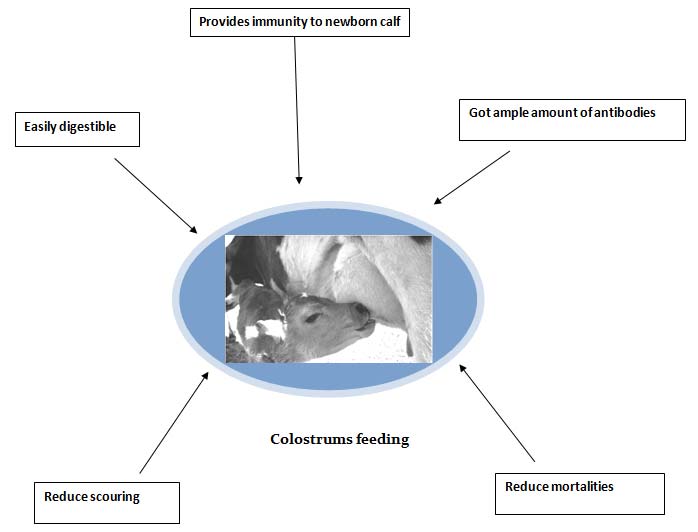 |
|
|
Translate this page in your preferred language:
|
| Colostrum Feeding To New Born |
| Back |
Colostrum Feeding
- The newborn calf should be fed colostrum during the first few days after birth for reducing health problems and ensuring better growth.
- The calf may be allowed to suckle the mother's udder or maybe pail or bottle fed within one hour of birth. The calf is needed to be trained for pail feeding as follows:
- At the beginning offer a finger to the calf for suckling and then slowly dip the finger in the milk pail. Subsequently the finger has to be lowered and gradually taken out of the pail till the calf begins to drink directly from the pail.

- The concentrations of protein and vitamins A, D and E in colostrum are initially
about five times those of whole milk, with a protein content of 17–18% compared with
milk’s 2.5–3.5%.
- However, within 2 days these are little different from those in whole
milk.
- The levels of vitamins in colostrum are dependent on the vitamin status of the cow.
- The blood proteins transfer passive immunity from mother to offspring through
maternal antibodies or immunoglobulins (Ig).
- The chances of calves surviving the first few weeks of life are greatly reduced if they
do not ingest and absorb these antibodies into their bloodstream.
- It takes far fewer
disease organisms to cause disease outbreaks in such calves than if they can acquire
immunity from their dam.
- Calves without adequate passive immunity are four times
more likely to die and twice as likely to suffer disease, than those with it.
- Furthermore in certain situations, blood levels of antibodies in heifer calves are directly related to their
milk production in later life.
|
Composition of Colostrum
|
Constituents
|
Colostrum of cow milk
|
Colostrum of buffalo milk
|
Normal Milk
|
|
Total solids
|
28.30
|
31.0
|
12.86
|
|
Ash
|
1.58
|
0.9
|
0.72
|
|
Fat
|
0.15-1.2
|
4.0
|
4.0
|
|
Lactose
|
2.5
|
2.2
|
4.8
|
|
Casein
|
4.76
|
7.7
|
2.8
|
|
Albumin
|
1.5
|
3.6
|
0.54
|
|
Globulin
|
15.06
|
12.5
|
-
|
|
Total protein
|
21.32
|
23.8
|
3.34
|
|
|
|
|
| Back |
|
|
Developed by :
|
Jaspal Singh
(Ex. M.V.Sc Scholar ) |
Dr. Pranav Kumar
(Assistant Professor)
|
Amandeep Singh
(Final Year B.V.Sc & AH student) |
|
|
|
|
|
|
Scroll
|
Division of Veterinary and Animal Husbandry Extension Education
Faculty of Veterinary Sciences and Animal Husbandry, R.S. Pura, SKUAST Jammu |

